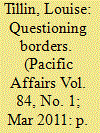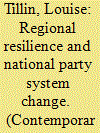|
|
|
Sort Order |
|
|
|
Items / Page
|
|
|
|
|
|
|
| Srl | Item |
| 1 |
ID:
139624


|
|
|
|
|
| Summary/Abstract |
This special issue examines the patterns, causes and consequences of India's 16th parliamentary elections. The 2014 elections broke records in terms of levels of voter participation, election expenditure and the number of political parties fielding candidates. The outcome marked a break from the past 30 years of India's electoral history with a single party – the Hindu nationalist Bharatiya Janata Party led by Narendra Modi – achieving a parliamentary majority on its own, without depending on coalition partners. Yet not all was new: there were strong continuities amid the change. In this collection, scholars present explanations for the BJP's success, analyse the extent to which urbanisation has acted as a disruptive force for electoral politics, look at the significance of a focus on leaders over political parties in the election campaign, assess the implications of the election result for the Indian party system and examine state-level contests in which regional parties held out against the BJP wave.
|
|
|
|
|
|
|
|
|
|
|
|
|
|
|
|
| 2 |
ID:
171979


|
|
|
|
|
| Summary/Abstract |
On August 5th 2019, the newly elected Bharatiya Janata Party (BJP) government in New Delhi moved the Indian Parliament to abrogate Article 370 and bifurcate the state of Jammu and Kashmir into two Union Territories. Months later, as the year came to a close, the Indian parliament passed a controversial amendment to India’s Citizenship Law. Several state governments came out in vocal opposition to the amendment, and some challenged the amendment in the Supreme Court. These events provided confirmation that the reelection of a majority BJP government has heralded far-reaching changes for India’s federal order, compounding shifts in the institutions and practice of federalism during Narendra Modi’s first term (2014–19). In this article, we assess the implications of the 2019 Lok Sabha elections for the future dynamics of federalism in the constitutional, administrative, and fiscal spheres under the second term Modi government.
|
|
|
|
|
|
|
|
|
|
|
|
|
|
|
|
| 3 |
ID:
103173


|
|
|
|
|
| Publication |
2011.
|
| Summary/Abstract |
As the world's largest multi-ethnic democracy, India has a federal constitution that is well-equipped with administrative devices that offer apparent recognition and measures of self-governance to territorially concentrated ethnic groups. This article analyzes how demands for political autonomy-or statehood-within the federal system have been used as a frame for social movement mobilization. It focuses on the most recent states to have been created in India: Chhattisgarh, Jharkhand and Uttarakhand, which came into being in 2000. These are the first states to have been created in India on a non-linguistic basis. Their creation has triggered questions about whether the creation of more, smaller states can improve political representation and help to make the state more responsive to diverse needs in India. This article draws attention to the processes which have brought borders into question, drawing social movements and political parties into alignment about the idea of creating new states. It ultimately looks at why the creation of states as a result of such processes may not lead to more substantive forms of political and economic citizenship on the part of marginalized communities. While the focus of the analysis will be on the processes that led up to statehood, the conclusions offer some insights into why pro-poor policy shifts at the national level in India have uneven regional effects. Despite the change in national political regime in India with the election of the Congress-led United Progressive Alliance in 2004, marginalized groups in India continue to experience the state through the refractive lens of multiple regional political histories.
|
|
|
|
|
|
|
|
|
|
|
|
|
|
|
|
| 4 |
ID:
139629


|
|
|
|
|
| Summary/Abstract |
For the first time in 30 years, a single national party has won a majority on its own in the Indian parliament, and does not depend on the support of regional party allies for a parliamentary majority. Yet it is too soon to pronounce the decline or marginalisation of regional parties in India's national political life. The aggregate performance of regional parties remained resilient in the 2014 elections, even marginally improving over 2009. This article considers whether the 2014 elections mark a critical break in the position of regional parties at the national level. The principal argument is that the 2014 elections do not reflect a fundamental alteration in the dynamics of political regionalisation. Rather they suggest a new phase in the impact of regionalisation on the party system at the national level. In a landscape of continually increasing voter choice, electoral outcomes at the national level have begun to narrow to favour a smaller range of parties since 2004. The number of parties able to achieve influence via participation in cabinet governance or coalition has begun to decline. Political fragmentation has not gone away, but its consequences for election outcomes have changed.
|
|
|
|
|
|
|
|
|
|
|
|
|
|
|
|
| 5 |
ID:
139664


|
|
|
|
|
| Summary/Abstract |
India and federalizing Nepal represent distinct types of federal polity: their origins lie not in the unification of previously autonomous states, but in the devolution of power by a previously centralized state. The boundaries of their constituent sub-units are therefore open to debate, and settling their contours is central to the project of state-building. Written by a political scientist and an anthropologist, this paper presents a comparative exploration of the reciprocal relationship between state structuring and ethnicity in India and Nepal, with a focus on the effects of territorial versus non-territorial forms of recognition. It pushes against recent tendencies within South Asian Studies to see ethnic identity as called into being solely by state practices or ‘governmentality’ on the one hand, or as a newly commoditized form of belonging produced through neoliberal reforms on the other. Instead it argues that ethnicity must be understood as a multivalent concept that is at once embedded in specific histories of state and sub-state formation, and generative of them. Comparative in scope yet driven by qualitative data collected over years of engagement across the region, the paper charts a middle way between detailed ethnographic studies and large-scale comparative endeavours.
|
|
|
|
|
|
|
|
|
|
|
|
|
|
|
|
| 6 |
ID:
152459


|
|
|
|
|
| Summary/Abstract |
This article examines the role of India’s states in shaping the implementation and framing of social policy within India’s federal system. Since the 2000s, the central government has overseen a substantial expansion of social welfare policies partly through a new push toward rights-based social provision. Yet, it is India’s states that are both responsible for an increasing proportion of total public expenditure on social welfare provision as well as determining the nature and effectiveness of that provision across space. Drawing on a comparative research program across pairs of Indian states, three critical factors explaining how state-level political environments shape social policy are identified: the role of policy legacies in shaping policy frames; the role of social coalitions underpinning political party competition; and the role of political leaders in strengthening state capacity to achieve program goals.
|
|
|
|
|
|
|
|
|
|
|
|
|
|
|
|
|
|
|
|
|